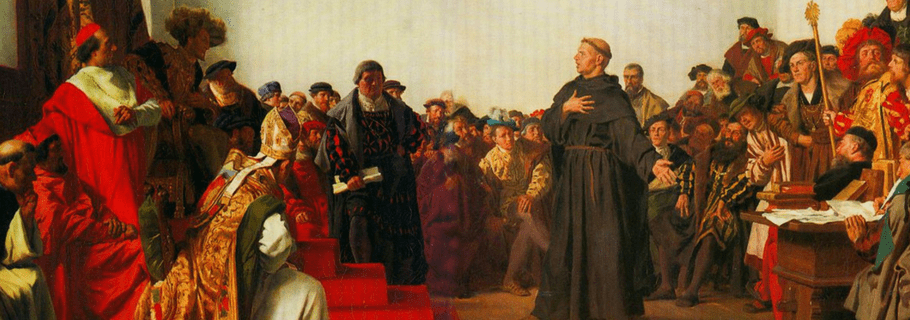This sponsored post was prepared by Zondervan Academic and includes material written by Frank James, Douglas Moo, and Peter H. Davids for Zondervan Academic Online Courses.
One of the decisive doctrines to emerge from the Protestant Reformation—and central to Luther’s theology—was the doctrine of justification by faith alone (sola fide). How did Luther come to understand justification? What, according to Romans, does it mean to be justified? And how are we to read Luther’s understanding of Paul alongside the book of James?
1. How did Luther develop the doctrine of justification that was eventually embraced by all Reformers?
Rather than seeing Luther’s theological discovery as a single decisive event, we should view it more as a gradual process.
Over the years, as Luther lectured on the Bible, his conception of God’s righteousness underwent a profound transformation. His early education had taught him to think of God’s righteousness as an “active righteousness” that demands that humans in their own strength measure up to God’s righteous standards.
Luther, however, came to the conviction that human effort is utterly unable to achieve this standard of righteousness unless God grants it graciously without regard to merit.
It was in the words of Romans 1:17 (“For in it the righteousness of God is revealed from faith to faith”) that Luther found solace for his own spiritual strivings.
The “righteousness of God” in this text is not, as he had been taught, referring to a divine attribute, but to the divine activity of clothing sinners in the righteousness of Christ through the gift of faith. Luther’s Romans lectures in particular contain most of the key concepts that would resound throughout history, such as the “alien righteousness” of Christ, “faith alone justifies,” and we are “at the same time sinners, yet non-sinners.”
But like a pebble in a pond, it took some time for the early theological insights to ripple throughout his whole theological system. The Protestant Reformation was not a singular event. Instead, the Reformation unfolded over many years.
2. What does it mean to be justified?
Romans 1:17 does not refer, in so many words, to “justification by faith.” However, the idea is clearly expressed: God’s righteousness is “by faith from first to last.” It is the one who is “righteous by faith” who will gain spiritual life. This is the doctrine of justification.
Through the gospel, God unleashes a power to change people, and at the crucial point: in their relationship to him.
When people respond in faith to the message of the good news, God “justifies” them. That is, he declares them innocent before him and removes the barrier that exists between all human beings in their natural state and God.
Everything else in the Christian life flows from this marvelous experience.
Christians, Paul says, are “justified.” But we have not yet appeared before God on the Judgment Day. How can we know that this verdict of justification will do us any good when that Day comes?
It is this underlying question that sparks his teaching here and throughout the chapter in Romans. The apostle’s answer is clear: In justifying us, God has already pronounced his verdict over us. It can be neither rescinded nor changed.
True, we must still appear before God to have our “case” disposed of.
But we can face that day with utter confidence, since God in Christ has already decided the case in our favor.
Justification releases us from any uncertainty or fear about that judgment.
3. How do we read Paul’s doctrine of justification alongside James’ words that “faith without works is dead”?
James writes that “a person is considered righteous by what they do and not by faith alone.” James also writes that “faith without works is dead.”
It seems we have two equal voices in the New Testament—Paul and James—contradicting each other. How are we to handle this?
What Paul and James mean by “works”
When Paul talks about faith and works, he always refers to “works of the law.” But James never uses that phrase.
When Paul wants to illustrate the works of the law he opposes, he uses the example of circumcision, Sabbath, and purity regulations. But when James speaks of the law, he refers to charitable deeds, obedient sacrificial actions, acts of hospitality. (And Paul repeatedly commends acts of charity and hospitality elsewhere—he’s clearly not opposed to these kinds of works.)
It’s clear that, even though Paul and James are both writing about works, they are writing about very different things.
What Paul and James mean by “faith”
Paul uses the word “faith” to mean commitment to Jesus (three times in Galatians 2:16 alone).
But James gives only one example of “faith,” and it refers to a kind of belief. He’s referring to the Jewish belief that “God is one,” the foundational statement of Jewish belief. He leaves “faith” undefined in the rest of the passage.
So is faith without works dead? What James seem to say is that our works don’t save us, but they do reflect a saving faith.
Learn more about the Reformation
In this video, Professor Frank James introduces you to the Reformation: how it started, how it unfolded, and what happened next. Take a look:










